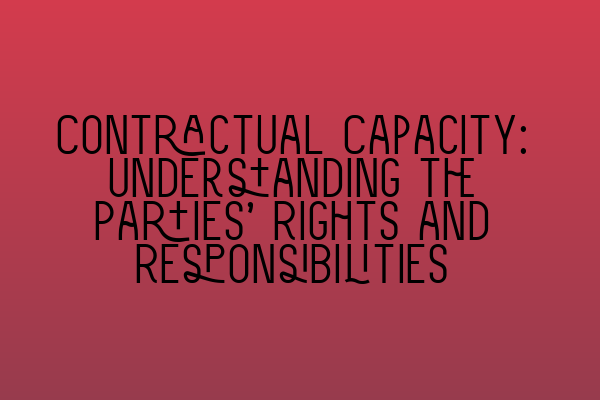Contractual Capacity: Understanding the Parties’ Rights and Responsibilities
Welcome to this comprehensive guide on contractual capacity, where we will delve into the intricacies of understanding the parties’ rights and responsibilities when entering into a contract. Whether you are a law student preparing for the SQE exams or a legal professional seeking to refresh your knowledge, this article will provide you with the essential information you need.
Before we dive into the details, it’s important to define what contractual capacity means. Contractual capacity refers to the legal ability of a person or entity to enter into a contract and be bound by its terms. It ensures that the binding agreement between parties is fair, just, and accurately represents their intentions.
Understanding the Parties’ Capacity
When entering into a contract, it is crucial to assess the capacity of the parties involved. Each party must have the mental and legal capacity to understand the terms of the contract and undertake the associated obligations.
In general, parties must meet the following criteria to have the necessary contractual capacity:
- Age: In most jurisdictions, individuals under the age of majority (usually 18 years old) are considered minors and are presumed to lack full contractual capacity. However, there are exceptions for contracts related to essentials like food, clothing, and shelter.
- Mental Capacity: Parties with mental impairments, such as those with cognitive disabilities or mental illnesses, may lack the capacity to enter into contracts. The degree of impairment will determine their ability to understand and fulfill contractual obligations.
- Intoxication: Contracts entered into while under the influence of drugs or alcohol may be voidable if the party lacked the capacity to understand the terms at the time of entering into the agreement.
- Bankruptcy or Insolvency: Parties who are declared bankrupt or insolvent may have limited or no contractual capacity, depending on the legal implications of their financial status.
It is essential to consider these factors when evaluating the parties’ ability to enter into a contract. Failing to do so may result in a contract being deemed unenforceable or subject to legal challenges.
Implications of Lack of Capacity
If one or both parties lack the necessary capacity when entering into a contract, several legal implications may arise:
- The contract may be voidable and can be rescinded by the party lacking capacity.
- The party with capacity can choose to affirm the contract or have it declared void.
- The court may appoint a guardian or representative to oversee the interests of the party lacking capacity.
- The contract may be deemed unenforceable.
Each jurisdiction may have specific laws and regulations regarding contractual capacity, so it is crucial to consult local legal resources to ensure compliance with relevant statutes.
Protecting Parties with Limited Capacity
Given the potential vulnerabilities of parties with limited contractual capacity, the law provides certain protections:
- Legal Guardianship: In cases where a party lacks the necessary capacity, a legal guardian may be appointed to protect their interests. The guardian can assess the suitability of the contract and ensure that the party understands the implications before entering into the agreement.
- Independent Legal Advice: Parties with limited capacity may seek independent legal advice to understand the terms and consequences of the contract. This extra layer of protection ensures that they have a clear understanding of their rights and responsibilities.
These safeguards help to prevent exploitation and ensure that parties with limited contractual capacity are given the necessary support and guidance.
Conclusion
Contractual capacity is a fundamental concept in contract law and plays a crucial role in ensuring fair and enforceable agreements. Understanding the parties’ rights and responsibilities when entering into a contract is essential to protect their interests and avoid legal disputes.
If you found this article helpful, be sure to check out these related resources:
- SQE Sample Papers: Practice for Exam Success
- Focus Areas in SQE1 and SQE2: Mastering Key Concepts
- Adjusting Your SQE Strategy Based on Mock Performance
- Practical Legal Skills (PLS) Mocks: Boosting Your Performance
- Peer Discussions Post-Mock: Learning from Collaboration and Feedback
We hope you found this guide informative and valuable. If you have any further questions or need legal assistance, please feel free to reach out to our team at SQE Contract Law. We are here to help!
